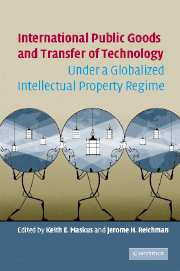Book contents
- Frontmatter
- Contents
- List of contributors
- Preface
- PART I International Provision of Public Goods under a Globalized Intellectual Property Regime
- PART II Innovation and Technology Transfer in a Protectionist Environment
- 8 Can the TRIPS Agreement Foster Technology Transfer to Developing Countries?
- Comment I: Technology Transfer on the International Agenda
- 9 Patent Rights and International Technology Transfer Through Direct Investment and Licensing
- Comment II: TRIPS and Technology Transfer – Evidence from Patent Data
- 10 Proprietary Rights and Collective Action: The Case of Biotechnology Research with Low Commercial Value
- 11 Do Stronger Patents Induce More Local Innovation?
- 12 Markets for Technology, Intellectual Property Rights, and Development
- 13 Using Liability Rules to Stimulate Local Innovation in Developing Countries: Application to Traditional Knowledge
- 14 Stimulating Agricultural Innovation
- PART III Sectoral Issues: Essential Medicines and Traditional Knowledge
- PART IV Reform and Regulation Issues
- Index
14 - Stimulating Agricultural Innovation
Published online by Cambridge University Press: 05 May 2010
- Frontmatter
- Contents
- List of contributors
- Preface
- PART I International Provision of Public Goods under a Globalized Intellectual Property Regime
- PART II Innovation and Technology Transfer in a Protectionist Environment
- 8 Can the TRIPS Agreement Foster Technology Transfer to Developing Countries?
- Comment I: Technology Transfer on the International Agenda
- 9 Patent Rights and International Technology Transfer Through Direct Investment and Licensing
- Comment II: TRIPS and Technology Transfer – Evidence from Patent Data
- 10 Proprietary Rights and Collective Action: The Case of Biotechnology Research with Low Commercial Value
- 11 Do Stronger Patents Induce More Local Innovation?
- 12 Markets for Technology, Intellectual Property Rights, and Development
- 13 Using Liability Rules to Stimulate Local Innovation in Developing Countries: Application to Traditional Knowledge
- 14 Stimulating Agricultural Innovation
- PART III Sectoral Issues: Essential Medicines and Traditional Knowledge
- PART IV Reform and Regulation Issues
- Index
Summary
Introduction
This chapter provides an interest analysis of the initiation and elaboration of the industrial property laws that govern plant breeding. It surveys the historical origins of plant variety protection laws and the emergence of patenting as an important modality for the protection of agricultural innovation. It concludes with an examination of the impact of these developments upon the international agricultural research environment.
Historical background
The first legislative proposal for the protection of agricultural innovations was the Papal States Edict of 3 September 1833 concerning the declarations of ownership of new inventions and discoveries in the fields of the technological arts and agriculture. This general measure was never implemented. The inclusion of agriculture in this instrument could not be attributed to the incentivization of innovations in plant breeding, as it anticipated, by two decades, the 1865 publication of the experiments of Mendel on the principles of heredity and, by almost seventy years, the rediscovery of his work by Correns, von Teschermak and de Vries in 1900.
Similarly, the inclusion of agriculture within the ambit of the 1883 Paris Convention for the Protection of Industrial Property could not easily be reconciled with any incentive thesis. Article 1(3) of that Convention had declared that
Industrial property shall be included within the broadest sense and shall apply not only to industry and commerce proper, but likewise to agricultural and extractive industries and to all manufactured or natural products, for example, wines, grain, tobacco leaf, fruit, cattle, minerals, mineral waters, beer, flowers and flour.
- Type
- Chapter
- Information
- International Public Goods and Transfer of Technology Under a Globalized Intellectual Property Regime , pp. 367 - 390Publisher: Cambridge University PressPrint publication year: 2005
- 2
- Cited by



